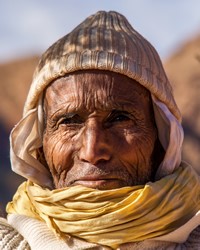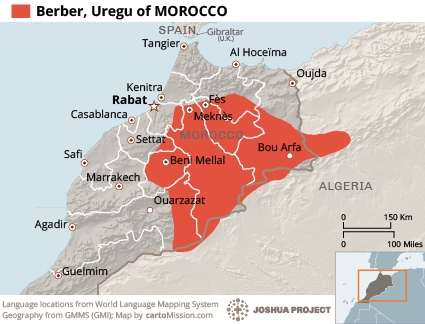Berbers are divided by subgroup, yet the generic term that they prefer is Imazighen, meaning, "Free men." Freedom and independence is a high goal of these people, who are much better known as Berbers, a term meaning "barbarians" slapped on them by the Roman Empire. Today the term Berber is so well-engrained that people seldom know who they are without using this derogatory term. Berbers are ethnically mixed with Arabs and spread over the country. One of their subgroups is the Uregu tribe. They live in the southeastern part of Morocco.
Berber society is primarily made up of farmers and merchants. As with other descendants of Subsaharan Africa, the Uregu Berbers are sometimes marginalized within Moroccan culture. Close knit Berber clans adhere to traditional customs, giving communities a strong sense of identity and loyalty. Moroccan Berbers have been less violent than those in Algeria in their resistance to Arabization, but Berber calls to re-examine Moroccan society have grown louder. The strong Berber cultural and linguistic influence in Morocco has made this country stand out from Arab nations to their east.
The Uregu Berbers are Sunni Muslims who believe that the One, Supreme God, Allah, spoke through his prophet, Mohammed, and taught mankind how to live a righteous life through the Koran and the Hadith. To live a righteous life, you must utter the Shahada (a statement of faith), pray five times a day facing Mecca, fast from sunup to sundown during the month of Ramadan, give alms to the poor, and make a pilgrimage to Mecca if you have the means. Muslims are prohibited from drinking alcohol, eating pork, gambling, stealing, slandering, and making idols. They gather for corporate prayer on Friday afternoons at a mosque, their place of worship. The two main holidays for Sunni Muslims are Eid al Fitr, the breaking of the monthly fast and Eid al Adha, the celebration of Abraham's willingness to sacrifice his son to Allah. Sunni religious practices are staid and simple. They believe that Allah has pre-determined our fates; they minimize free will. In most of the Muslim world, people depend on the spirit world for their daily needs since they regard Allah as too distant. Allah may determine their eternal salvation, but the spirits determine how well we live in our daily lives. For that reason, they must appease the spirits. They often use charms and amulets to help them with spiritual forces.
Uregu Berbers need to put their faith in Jesus Christ rather than the spirit world or Allah. He is the only way, truth and life. No one comes to the Father except by him!
Pray for good schools and medical facilities in the Uregu Berber homeland. Pray for Uregu Berbers to tire of works-righteousness and crave a relationship with a sin-forgiving Savior. Pray for the Lord to give dreams and visions of the risen Christ to Uregu Berber elders. Pray this will be the decade of spiritual harvest in Morocco.
Scripture Prayers for the Berber, Uregu in Morocco.
| Profile Source: Joshua Project |











